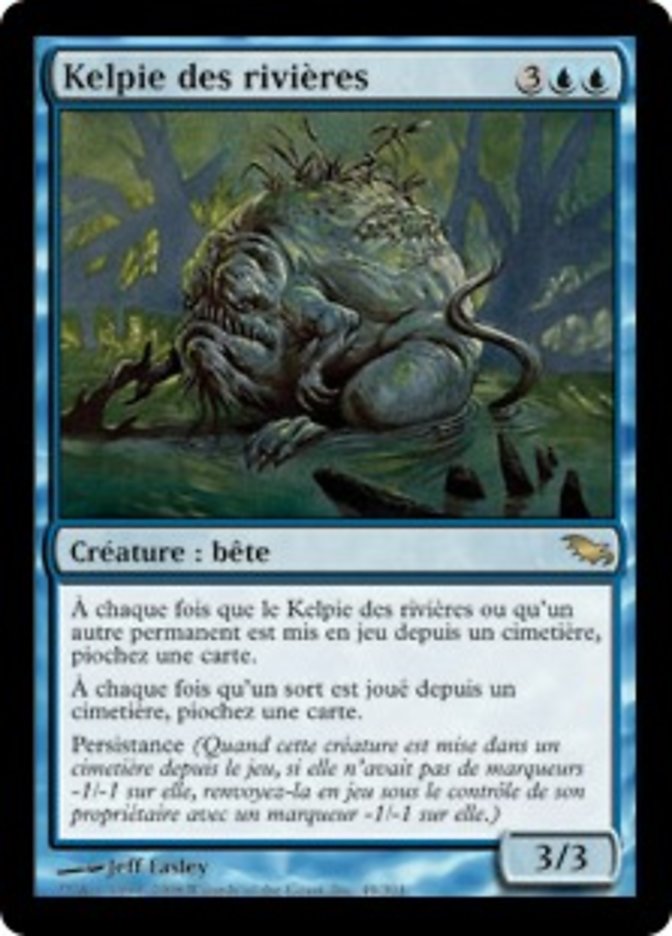
Kelpie des rivières {3}{U}{U}
Créature : bête
À chaque fois que le Kelpie des rivières ou qu'un autre permanent est mis en jeu depuis un cimetière, piochez une carte.
À chaque fois qu'un sort est joué depuis un cimetière, piochez une carte.
Persistance (Quand cette créature est mise dans un cimetière depuis le jeu, si elle n'avait pas de marqueurs -1/-1 sur elle, renvoyez-la en jeu sous le contrôle de son propriétaire avec un marqueur -1/-1 sur elle.)
3/3
Illustrated by Jeff Easley
- Standard
- Not Legal
- Alchemy
- Not Legal
- Pioneer
- Not Legal
- Explorer
- Not Legal
- Modern
- Legal
- Historic
- Not Legal
- Legacy
- Legal
- Brawl
- Not Legal
- Vintage
- Legal
- Timeless
- Not Legal
- Commander
- Legal
- Pauper
- Not Legal
- Oathbreaker
- Legal
- Penny
- Legal
Toolbox
Buy This Card
Notes and Rules Information for Kelpie des rivières:
- Only the English version of a Magic card receives Oracle updates and errata. View this card in English. (Scryfall note)
- River Kelpie doesn't give you the ability to cast spells from graveyards. Its second ability merely triggers whenever a spell is cast this way (by using Memory Plunder, for example). (2008-05-01)
- If River Kelpie and another permanent are each put onto the battlefield from a graveyard at the same time, River Kelpie's first ability will trigger twice. (It will see the other permanent entering.) (2008-05-01)
- If you cast another artifact, creature, enchantment, or planeswalker spell from a graveyard, only the second ability triggers. That's because the card is put onto the stack, not onto the battlefield. (2008-05-01)
- If you cast River Kelpie itself from your graveyard (by using Yawgmoth's Will, for example), neither ability triggers. The first ability doesn't trigger because River Kelpie is put onto the stack; the second ability doesn't trigger because it works only while River Kelpie is already on the battlefield. (2008-05-01)
- If you play a land card from a graveyard (by using Crucible of Worlds, for example), only the first ability triggers. That's because the land (which isn't a spell) is put directly onto the battlefield from the graveyard. (2008-05-01)
- If a creature with persist stops being a creature, persist will still work. (2013-06-07)
- The persist ability triggers when the permanent is put into a graveyard. Its last known information (that is, how the creature last existed on the battlefield) is used to determine whether it had a -1/-1 counter on it. (2013-06-07)
- If a permanent has multiple instances of persist, they'll each trigger separately, but the redundant instances will have no effect. If one instance returns the card to the battlefield, the next to resolve will do nothing. (2013-06-07)
- If a token with no -1/-1 counters on it has persist, the ability will trigger when the token is put into the graveyard. However, the token will cease to exist and can't return to the battlefield. (2013-06-07)
- When a permanent with persist returns to the battlefield, it's a new object with no memory of or connection to its previous existence. (2013-06-07)
- If multiple creatures with persist are put into the graveyard at the same time (due to combat damage or a spell that destroys all creatures, for example), the active player (the player whose turn it is) puts all of their persist triggers on the stack in any order, then each other player in turn order does the same. The last trigger put on the stack is the first one that resolves. That means that in a two-player game, the nonactive player's persist creatures will return to the battlefield first, then the active player's persist creatures do the same. The creatures return to the battlefield one at a time. (2013-06-07)
- If a creature with persist that has +1/+1 counters on it receives enough -1/-1 counters to cause it to be destroyed by lethal damage or put into its owner's graveyard for having 0 or less toughness, persist won't trigger and the card won't return to the battlefield. That's because persist checks the creature's existence just before it leaves the battlefield, and it still has all those counters on it at that point. (2013-06-07)